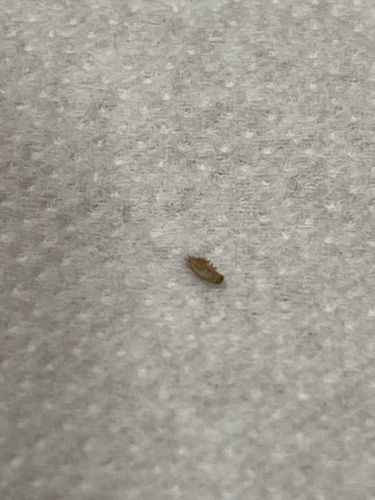Carpet beetle larva (possibly Varied Carpet Beetle or Black Carpet Beetle)
Scientific Name: Dermestidae (larva)
Order & Family: Coleoptera, Dermestidae
Size: 2-5 mm (larval stage)

Natural Habitat
Indoors, especially in undisturbed areas like carpets, rugs, upholstered furniture, closets, attics, and around baseboards where lint, pet hair, or dead insects accumulate. Can also be found in museums and food storage areas.
Diet & Feeding
Keratin-rich materials such as wool, silk, fur, feathers, leather, pet hair, dried animal remains (including dead insects), and sometimes dried plant products and stored foods.
Behavior Patterns
Larvae are typically slow-moving and avoid light. They feed discreetly on organic matter. The 'hairy' or bristly appearance is characteristic of carpet beetle larvae. They undergo complete metamorphosis, developing from egg to larva, pupa, and then adult beetle. The larval stage is the most destructive.
Risks & Benefits
Potential risks include damage to fabrics, carpets, clothing, and other keratin-containing items in homes and museums. They do not bite or transmit diseases to humans. Benefits are minimal in an indoor setting, but in nature, dermestid beetles can be involved in decomposition processes.
Identified on: 9/9/2025